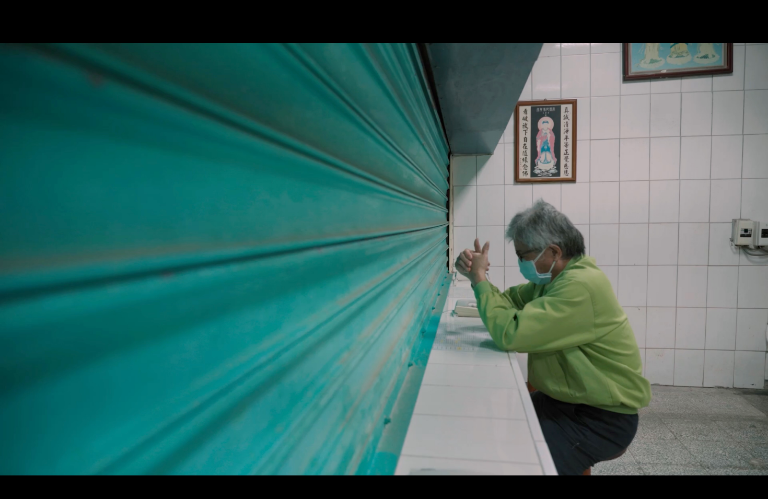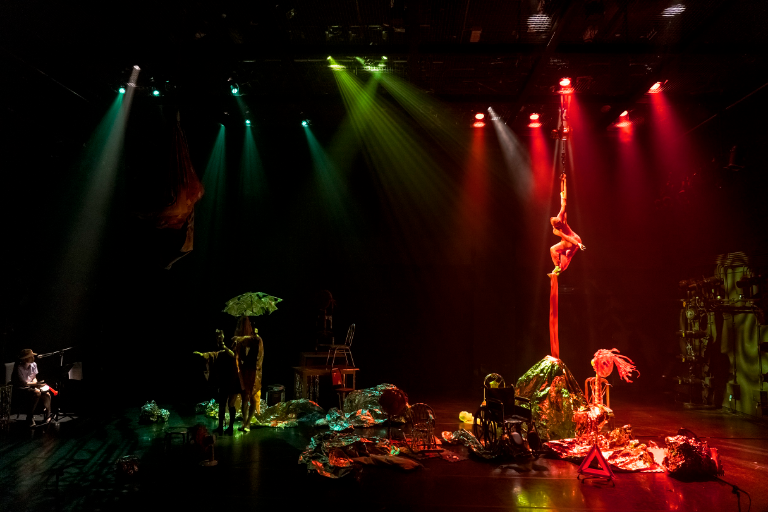Our house is our corner of the world. As has often been said, it is our first universe, a real cosmos in every sense of the word. —Gaston Bachelard, The Poetics of Space
18 years have elapsed since Flying Group Theatre was founded in May 2004. Centering on "non-human" characters, its name in a Chinese is a homonym for "non-human", in other words, puppetry. This troupe continues to delight audiences with stylistically distinctive works. Its brand image is defined by works such as: For All Age Groups —The Trilogy: A Sleep and a Forgetting, which has been repeatedly invited to stage performances; Close to You, which alludes to a connection between literature, history, and communities; and the continuously evolving Hear the House project 1. These works may also be seen as corners of the house of Flying Group Theatre, each safeguarding charming and distinctive objects and memories.
At the end of 2021, when the COVID-19 pandemic was a major challenge to performing arts professionals, Pei-Yu Shih, the director of Flying Group Theatre, was sitting quietly in their office, recalling the time when Flying Group Theatre was yet to be formed…
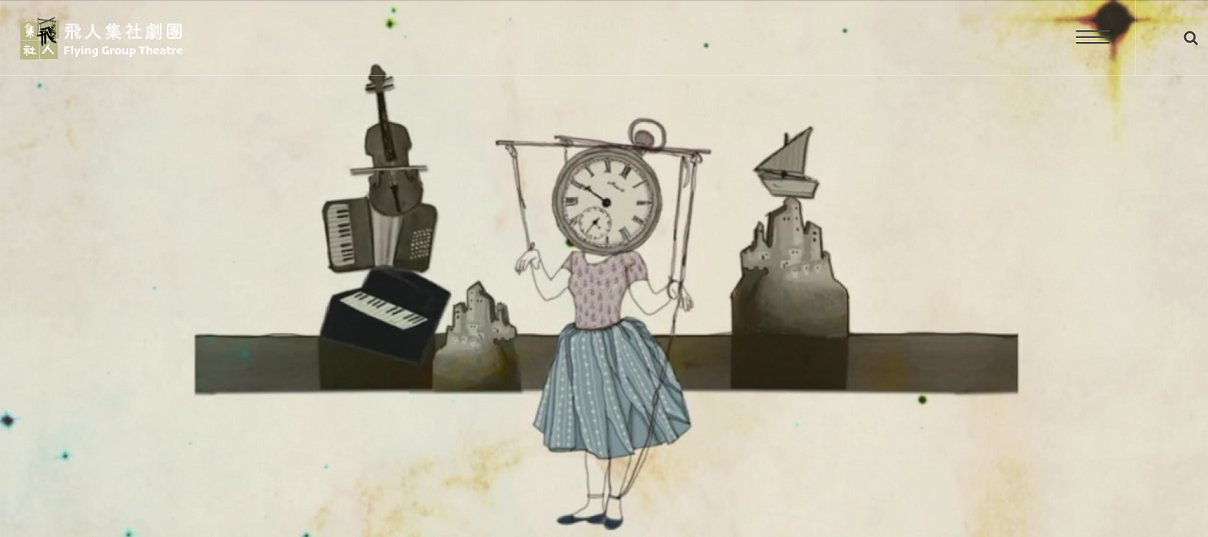
Flying Group Theatre website (image from Flying Group Theatre website)
The Kitchen, debut performance of Flying Group Theatre
The Kitchen 2 was first performed at the Crown Art Center Theater in April 2004 as a feature show in the 3rd Taiwan Women Theatre Festival.
The play was about one hour long. Mixing human actors, puppets, and videos, Pei-Yu Shih wove these elements into symbolism for the Legend of the White Snake—a famous Chinese folktale dating back to the Tang Dynasty—to represent women's business in the kitchen, something always on her mind.
When the curtain rose, dim light shone on the black box theater and a "kitchen" appeared before the audience. The play began with the sound of a cook's knife in the actor Chao-Chi Ma's hands. ...
With certain hurry, the slicing of the knife can be heard as the ingredients turn from chunky into finely chopped ones; next, the clanging of music gradually becomes audible, mixed with a faint rumbling sound resembling a range hood. The woman wipes her hands and throws all the chopped ingredients into a pot, as if to draw a close to her work in the kitchen. She then takes out a book from the top shelf. Surrounded by the increasingly articulate human voices from the radio, she leafs through the book.
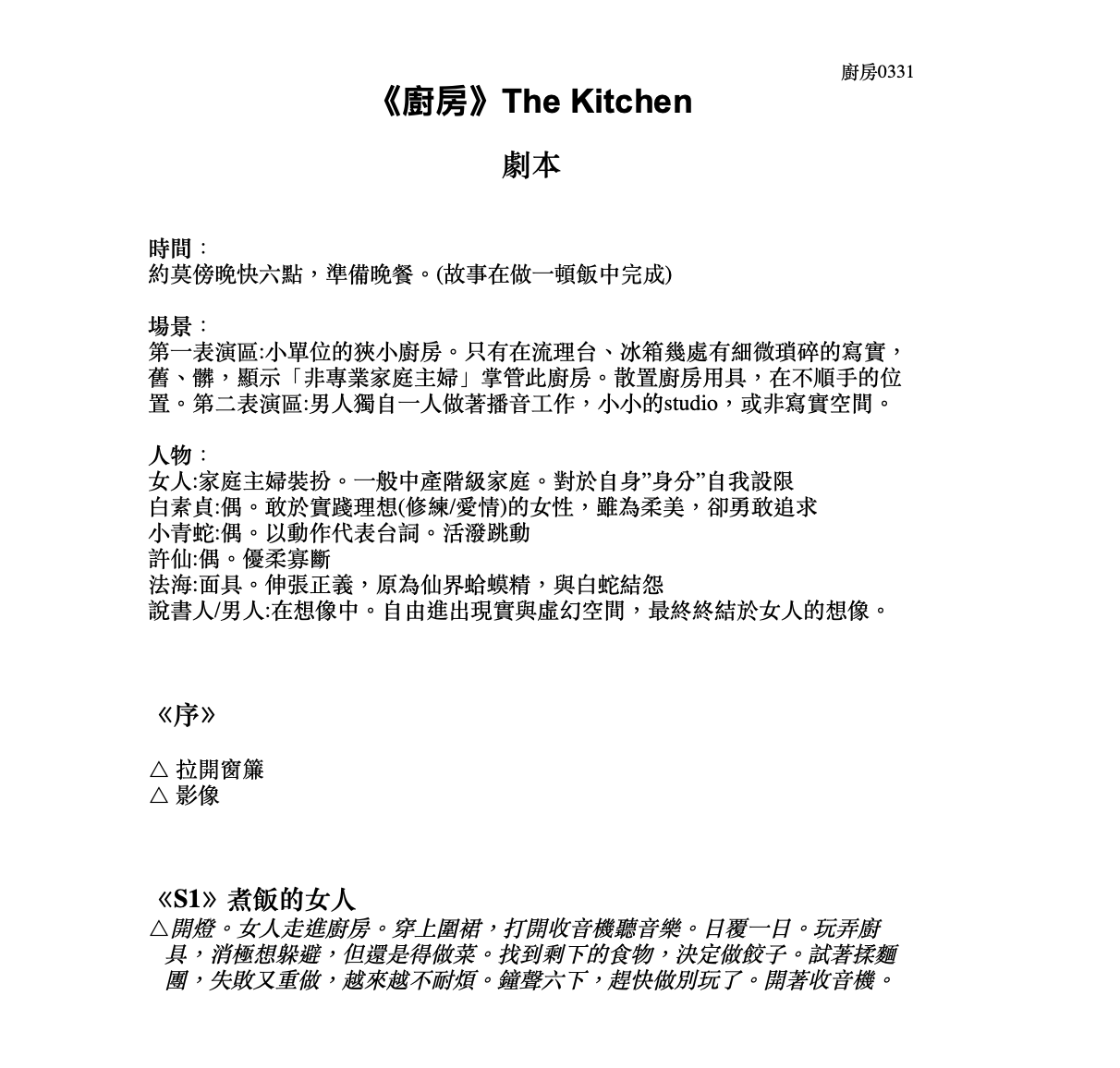
Script files of The Kitchen (courtesy of Flying Group Theatre, written by Pei-Yu Shih)
All of a sudden, a "Hello!" is heard, Spirited and energetic, the word pierces through the hitherto calm ambiance of the kitchen—that’s the sound from the radio, a masculine voice presenting The Legend of the White Snake in a new style of storytelling. What follows are a series of scene changes: At an unexpected moment, the radio host suddenly appears on stage, his body emerging out of the "refrigerator", and continues his story. In the next scene, another actor, Mei-Hua Hsueh, joins the stage with puppets in hand to perform her part. Pots, pans, and puppets are infused with life as The Legend of the White Snake progresses. With every corner of the kitchen involved in the drama, the play feels like an allegory of every stage of life, reflected by the shifts in lighting. During the performance, the audience often laughed out loud. Though emotion is the main appeal, The Kitchen is never without a sense of humor. 3
Why The Legend of the White Snake? "Because I thought at that time that Su-Chen Pai (the "white snake") is a powerful woman and the master of her own fate, but she eventually chooses to become a housewife in the kitchen." When writing the play, Pei-Yu Shih was thinking about the inevitable "choice" that confronts Su-Chen Pai, whose case resonates with her own multiple identities as a director, puppet designer, and playwright.
In the social climate more than 20 years ago, women were still shackled by strict and almost unchallengeable gender expectations, as if getting married and devoting herself to a family is the only reasonable life path for a woman. "I was also thinking, should I stop taking individual projects as a freelancer and settle down? It's like I had to think about working harder to build a family of mine, or…working harder to build 'something' that might truly be mine? It was time to take things seriously, but what kind of things?" When these thoughts occurred to Pei-Yu Shih, she happened to be working in the theater sector. In the meantime, the 3rd Taiwan Women Theatre Festival, organized by a crew of women, was just about to take place."… The curator then was Yu-Hui Fu. She talked me into this, so I joined the festival." When she was reaching the marriageable age according to conventional values, Pei-Yu Shih turned to theater, transforming her conceptions and aspirations for a "family".
Since 1996, the Taiwan Women Theatre Festival4 has been held every four years. Its "all-woman crew" in curating, writing, direction, and project execution created an alternative and did away with the male dominance of Taiwan's small theaters in the 1980s, marking an exceptional chapter in the history of Taiwan's performing arts. However, what is a "woman"? Is there one unquestionable definition? How to be a "woman"? Should there be some kind of manual to must follow? These are key questions that merit continuous critical exploration. Pei-Yu Shih repeatedly asked herself such while taking part in the Festival and working on The Kitchen. As she confessed: "I must say that I have been lucky. Since childhood, I received education and training from my family that made me feel that 'gender' is not an issue . . . I mean, no one ever said to me something like 'hey, a girl can't do this, a girl should be like that'. So, I don't keep thinking that I'm a girl, or to put it differently, there's nothing I can't do as a girl. So, um, I felt a little awkward when taking part in a women's event (laugh)." As it happens, art is often a tool and channel to discuss this kind of dilemma.
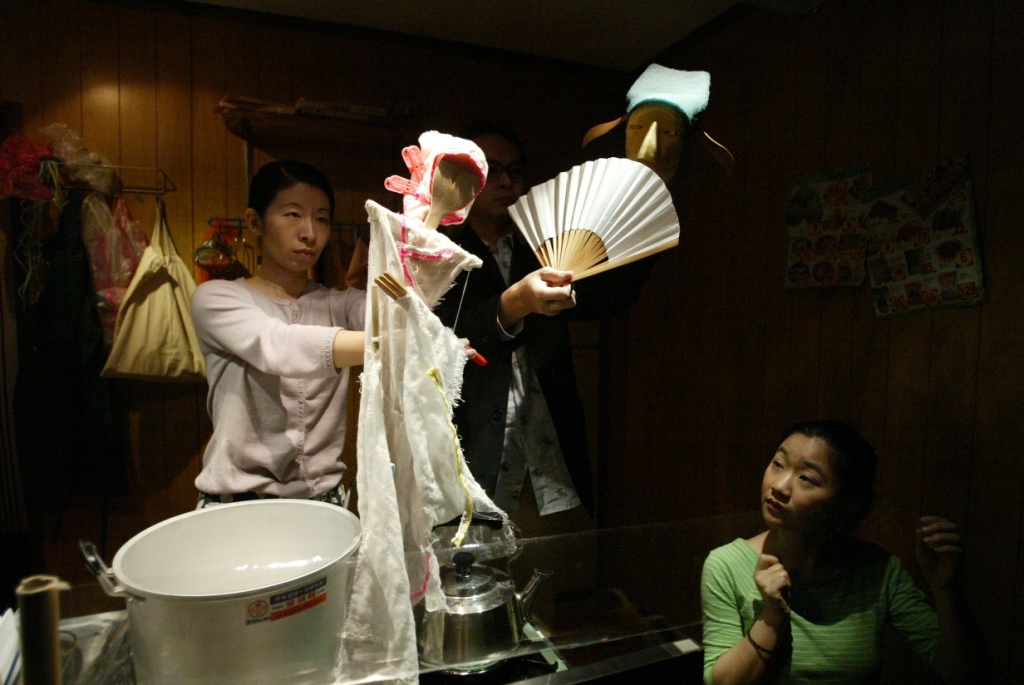
The Kitchen @ Crown Art Center Theater, 2004 (courtesy of Flying Group Theatre)
To match the Festival's emphasis on "woman", Pei-Yu Shih finally chose the "kitchen" as the central image to represent women as well as her life experience during that period. For her, it is a place with the strongest maternal aura: "The kitchen is the engine of the family. I mean, it needs to be ignited to make the house warm." Of course, the most important thing is that the "mother" is in there; at least it was so vividly in her cherished memories: “When I was young, my mum used to turn on the radio whenever she was cooking in the kitchen. So, whenever we heard sounds coming from the kitchen, we knew 'Mom's there!'. The kitchen was also the first place we children ran up to whenever we got home, sometimes to report things, sometimes just to get a snack (laugh) or to wait for dinner at the table outside the kitchen. So for me, many precious memories of my life come from there. For me, it really was a place of much warmth." She continues: "I was looking at her, the maker of all the warmth. Did she also feel the warmth inside? My mom had a high educational background, but she ended up being a housewife. I couldn't help but wanting to know: is that what she wanted?" Recalling the kitchen in her house, Pei-Yu Shih pointed out that it was located at the far end of the house. One had to cross the living room and many other rooms to get there. "The ultimate concern of The Kitchen is: what exactly is happiness?"
In this manner, Pei-Yu Shih seemed to raise questions for herself by having another conversation with her mother, this time as an image in her mind. Artists thus face their deepest concerns through their work.
Although she did not study theater as a profession, she had been fascinated with drama. Pei-Yu Shih first worked as administrative staff for nearly ten years at her early stage of her career. The groups she worked for were all prestigious ones: Shiny Shoes Children's Theatre and Contemporary Legend Theatre, among others. From 1997 to 2002, she also served as manager and producer of Creative Society for five years.5 What does it feel like, debuting as a playwright and creator after working in art administration for so many years?
She said: "Well, if you ask me, I don't think the real debut of Flying Group Theatre was The Kitchen!" The Kitchen, as it turns out, is not her first work.
A Hidden Piece of History: B612, Before Flying Group Theatre
Indeed, The Kitchen was the first production in which Flying Group Theatre applied for a grant, but the work that actually catalyzed the establishment of Flying Group Theatre, in Pei-Yu Shih's heart, is B612, which was performed at Guling Street Avant-garde Theatre in 2002. Performed before Flying Group Theatre was established, this play was the troupe's real debut for her.
Speaking of her aspiration to create art, Pei-Yu Shih recalled how it was ignited during her time doing children's theater as a pastime. As a matter of fact, everyone in the theater scene was willing to put their all at the time, so as long as you wanted this, you could have a chance to try it out, to make a small work by yourself. Back then, the Shiny Shoes Children’s Theatre which I took part in had a theater called Small Shoes House that had regular performances every week. So the amount of performances was large, which means there was enough market demand to offer opportunities." Later, Pei-Yu Shih's administrative experience in various theater troupes also gave her the opportunity to learn how to produce a theatrical work and build a blueprint for her future career: "The wide range of my experience with theater made me understand the complexity of administrative affairs, of running a theater company. So, I wanted to actually make a play to figure this out, to figure out if I was able to form a theater company myself." So B612 was the testing ground for her "self-assessment".
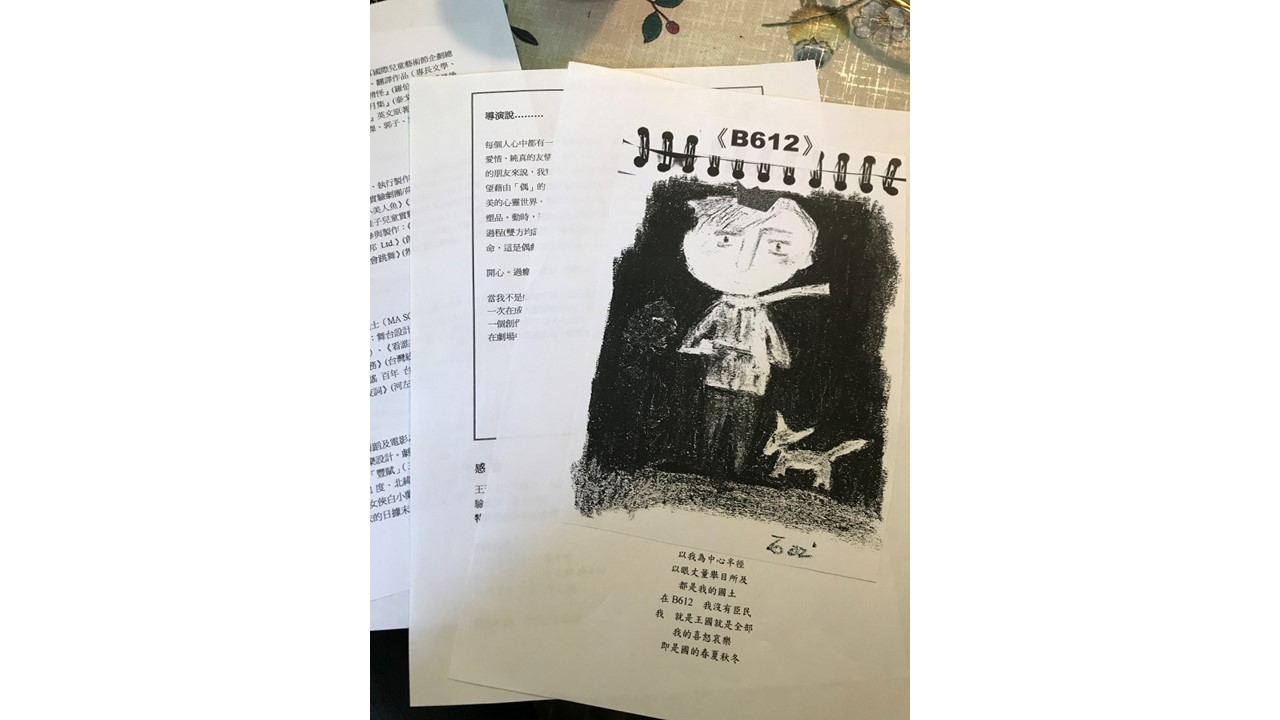
Program of B612, 2002 (courtesy of Flying Group Theatre, hand-drawn by Pei-Yu Shih)
The script was written by Huei-Na Lee, while Pei-Yu Shih acted as the puppet designer and director. "What about the administrative staff?", I asked. "No administrative staff! There was only me!" As there was a shortage of helpers, she did most of the jobs on her own. Recalling the crew of B612, she pointed out: "There were very few people; just a few designers, myself, and two actors. I also engaged Sheng-Ju Chao to help with the administrative matters, but basically, I had to deal with most of the matters on my own, the front desk and everything." Even the program was handmade by herself. The tickets were produced, copied, and then brought to the National Taxation Bureau for stamping. Her friends and family learned about the play through word of mouth. They left their contact numbers to express their interest, but whether they would actually show up was not ascertained until the actual staging. As for why they didn't register and apply for a grant before implementing the project? "Because I missed the deadline for grant application just when I made up my mind to do this. But, you see, the money issue cannot hold you back when you really want to do it! At that time, I thought that where there is a will there is a way. Just do it and see what happens." Those who know Pei-Yu Shih can probably feel the vivacity and energy inside her. There was a newspaper story with a heading that read "Produced by Pei-Yu Shih Out of Her Own Pocket". It not only exemplifies the straightforward style of news report titles of the time but also reflects Pei-Yu Shih's own upbeat charm.
When B612 was officially performed, many friends and teachers who became acquainted with her in past theatrical projects came to watch the play. People from Creative Society, whom she playfully called "bosses", also showed up in the audience. The booking record show that many notable theater people, including Wei-Jan Chi, Ya-Hung Hsu, Ying-Chuan Wei, Yih-Fang Wu, Liang-Hui Shen, and Huan-Hsiung Li, purchased tickets.
Although people are very likely to associate these puppet shows and objects with "children" and "innocent fun", Pei-Yu Shih was targeting an adult audience when working on B612—as the opening sentence of the preface to Antoine de Saint-Exupéry's The Little Prince states, "I ask the indulgence of the children who may read this book for dedicating it to a grown-up." Anyone who has seen excerpts of B6126 can feel that the rhythm, language, voice, puppet design, and the use of light and shadow are all full of an "adult" flavor. One can imagine how refreshingly original it was at the time.
Pei-Yu Shih recalled her experience with Craig Quintero, whom she engaged to help with the video recording gave her memorable feedback for B612: "Craig Quintero, he even came to see my play twice. We were not familiar with each other back then. But after he finished watching the play he even walked me home from the theater, and during the journey, we had a conversation for more than an hour. He was much more experienced with small-scale theater than me. I guess he was probably thinking 'I have never seen a form of expression like this'. To be honest, at that time, there were indeed very few works which mixed human actors with puppets and had a relatively strong visual style." Pei-Yu Shih's insistence on making a puppet show for adult audiences broke with conventions at the time. This is probably a major reason why Flying Group Theatre has attracted people's attention ever since.
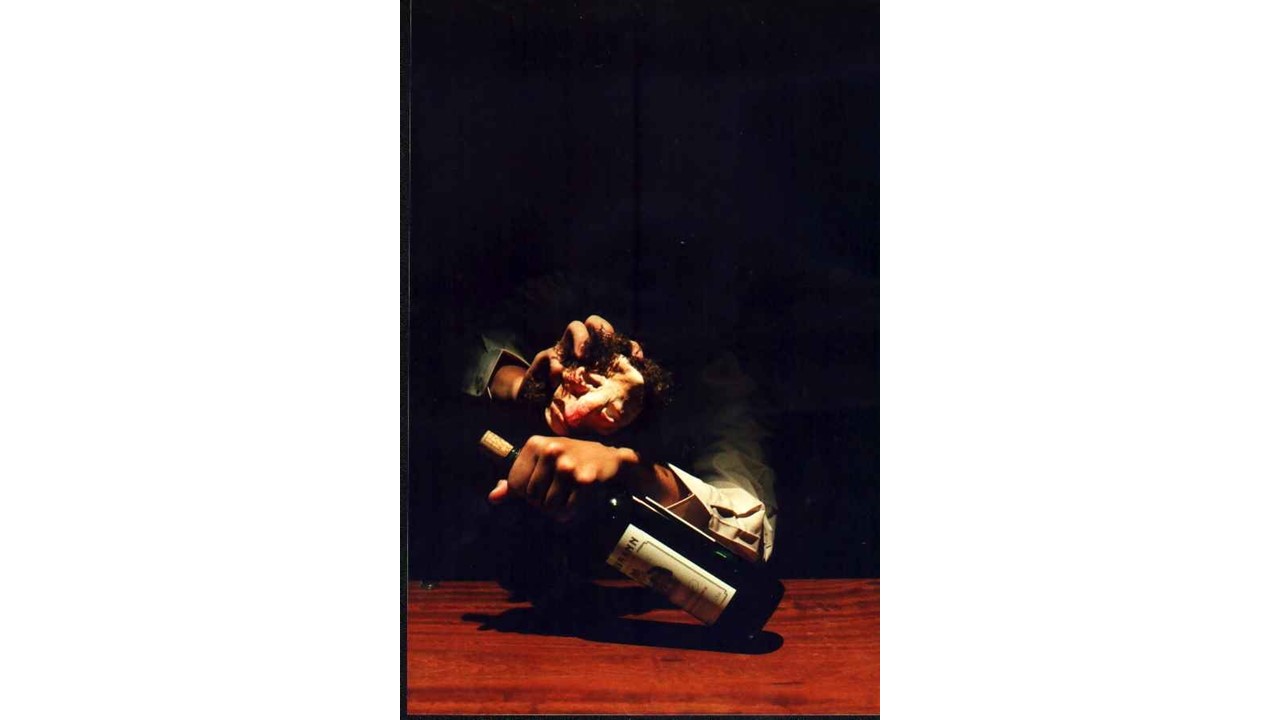
B612 @ Guling Street Avant-garde Theatre, 2002 (courtesy of Flying Group Theatre)
The Challenge of "Starting a Family"
Although B612 received positive feedback, Pei-Yu Shih did not immediately move on to form a troupe in 2002. On the contrary, she took a two-year break and continued taking freelance projects. "B612 made me realize that I really can do it. But I had other things in mind too . . ." She pointed out that, as an artist, she also spent a lot of time thinking about the "organization of a theater troupe".
"Working in different companies allowed me to see many different organizations. We call the team of Shiny Shoes the 'Seven Immortals'. Each member is so capable that they can carry out their individual projects on their own around Taiwan and can assemble at any time to make a big show. Or take Creative Society, whose eight members are all owners, not staff, as an example. In short, troupe organization varies a lot. So actually, I kept thinking, if I started a troupe, how would I coordinate administrative and creative matters?" It takes more than just enthusiasm to build something. One has to be equipped with the basics, which in the world of arts roughly means production, publicity, and funding.
Readers may gain some idea about the actual production and administration in theater's early days in 40 Years of Taiwan Contemporary Theater (1978-2018). This book mentions the human resources and financial management of 40-plus modern theater teams in 1993, recorded in The Catalog of Performing Arts Groups published by the Council for Cultural Affairs in 1995: "In the current year, government grants accounted for an average of approximately 39% of each group's annual budget, corporate sponsorship accounted for 16%, and performance revenue contributed 13% . . ."7 Although this survey result may be incomplete—it did not include "all" theater groups at that time for various reasons, we can still get some idea about the overall landscape of that time.
We may take a different perspective: from Pei-Yu Shih's personal experience. Flying Group Theatre was taking shape in the early 2000s. At that time, Taiwan's theater had been developing for only a bit over a decade. Performance information was conveyed mainly through printed newspapers and in-person press conferences. In addition, ticket sales relied much on the word of mouth of family members and friends, the marketing channels were far less developed than at present, and productions required far more human resources. For this reason, it was crucial for a performing team to receive financial aid to complete productions. "In the early days, it was basically impossible to do anything without grants. Firstly, they accounted for a major share of the crew's income. The ticket price was low and the box office performance was inconsistent compared to now. The market was very small and the marketing channels were painfully scanty. At that time, the ticket price would be considered high even when set at just NT$250 or NT$300! Support from grantors is really important. This could even decide your fate, your ability to carry out your project. It was brutal." The self-funded B612 was a reassurance for Pei-Yu Shih. Thanks to this play, she had ample time to think over all aspects that she needed to take care of in order to be the "head of the family" before she "started a family" in 2004.
Speaking of the dilemma in dealing with arts grantors, she remarked: "Even if we applied for a grant with success, we would still be worried. For instance, if the grant amount was small, wouldn't that mean we still should somehow make it happen against all odds? Our grant was really meager, so we couldn't do it. If we had continued, we would've gone bankrupt . . . So, in the early days, you had to abort projects occasionally because of this…" After being premiered at the Taiwan Women Theatre Festival in Taipei in 2004, The Kitchen applied for grants from NCAF and planned a performance tour across Kaohsiung (Spring Wind Art Theatre) and Yilan (Traditional Opera Hall, National Center of Traditional Arts). Later, although this work was supported by a grant of NT$150,000, human resources remained an issue. No matter how much it was streamlined, a tour would still require a crew of eight to nine people, including the cast. Four shows would require at least two to three days of expenditures. Coincidentally, Spring Wind Art Theatre was also moving out of the "Spring Cultural Underground", its performing space on the basement. After much deliberation, Pei-Yu Shih decided to give up on the endeavor.
Did she not consider using her connections to draw corporate sponsorships and make up for the deficiency? She laughed and said that of course she had some connections, but "At that time, it was really difficult for you to explain to people what a 'modern puppet show' is. People's first thought on hearing this would be children's drama, but that was not what I wanted to do. Under such circumstances, we had to spend a lot of energy to explain this stuff to others and they might still not understand it, so it was quite unlikely to find a company willing to sponsor us. A typical scenario was that I sent dozens of proposals but got no reply at all, or just one, for which we would be very grateful. Oh, but the reply would normally be just a reply, not a promise to fund you. The general conditions of this industry were rough like that." But from 2004 to 2008, Pei-Yu Shih continued to produce works: Alice (2004), Mr. D (2005), Memory (2006), The Light of Darkness (2006), and The Bathroom (2007). In 2008, she was invited to the 2008 Beijing Cross-Strait Youth Theater Festival in Beijing on a grant of NT$180,000 from NCAF, thus further promoting B612, the company's real debut.
Toward the Next Stage?
Looking closely at works of Flying Group Theatre over the years, one can notice that since The Kitchen in 2004, subsequent works include The Bathroom, The Room, and Livingroomroute, all of which are components of a house. Does this mean that Flying Group Theatre was piecing together the image of a house with these works? "Oh, yes, yes. The kitchen is an engine of warmth. The bathroom can keep private secrets; you can cry over anything in there. When you finish, you get rid of it by flushing it down the toilet and come out. And the room hides other people's secret, not yours . . ." At this point, Pei-Yu Shih and the troupe manager Wan-Ping Chuang spoke in chorus of the future Prefab project: "We are talking about it. What we mean by prefab is an assemblage of these spaces into one unit. We can find a model house which is about to be abandoned. We will use it for a scene of the living room on one day and of the kitchen on another." It seems that the developmental trajectory of Flying Group Theatre has been true to its spirit from the beginning to present.
Although the first hit series under Flying Group Theatre is likely to be Close to You since 2010, the interpretive framework of home space as mentioned above may draw our attention to the Hear the House performing project, which started in 2016 and is more comprehensively representative of Flying Group Theatre at present.
The project was conceived to achieve the mission of "revitalizing old houses and abandoned places as artistic and cultural spaces". The troupe performed Treasured Fragment—first presented in the 321 Art Alley Settlement in Tainan in 2015—across seven old buildings in six cities in Taiwan. These buildings included Butt Mountain and Yue Yue Bookstore in Taipei; Hodala Cafe in Zhongxin Market, Taichung; Mix Art Center in Chiayi; the old principal's residence in National Hualien Girls' Senior High School in Hualien; Takao Renaissance Association in Kaohsiung; and Yunlin Story House in Yunlin8 . Bringing out the life of old things in response to the memories from old spaces, they reinstilled life into these old houses through the movement of puppets and the accumulation of images through time.
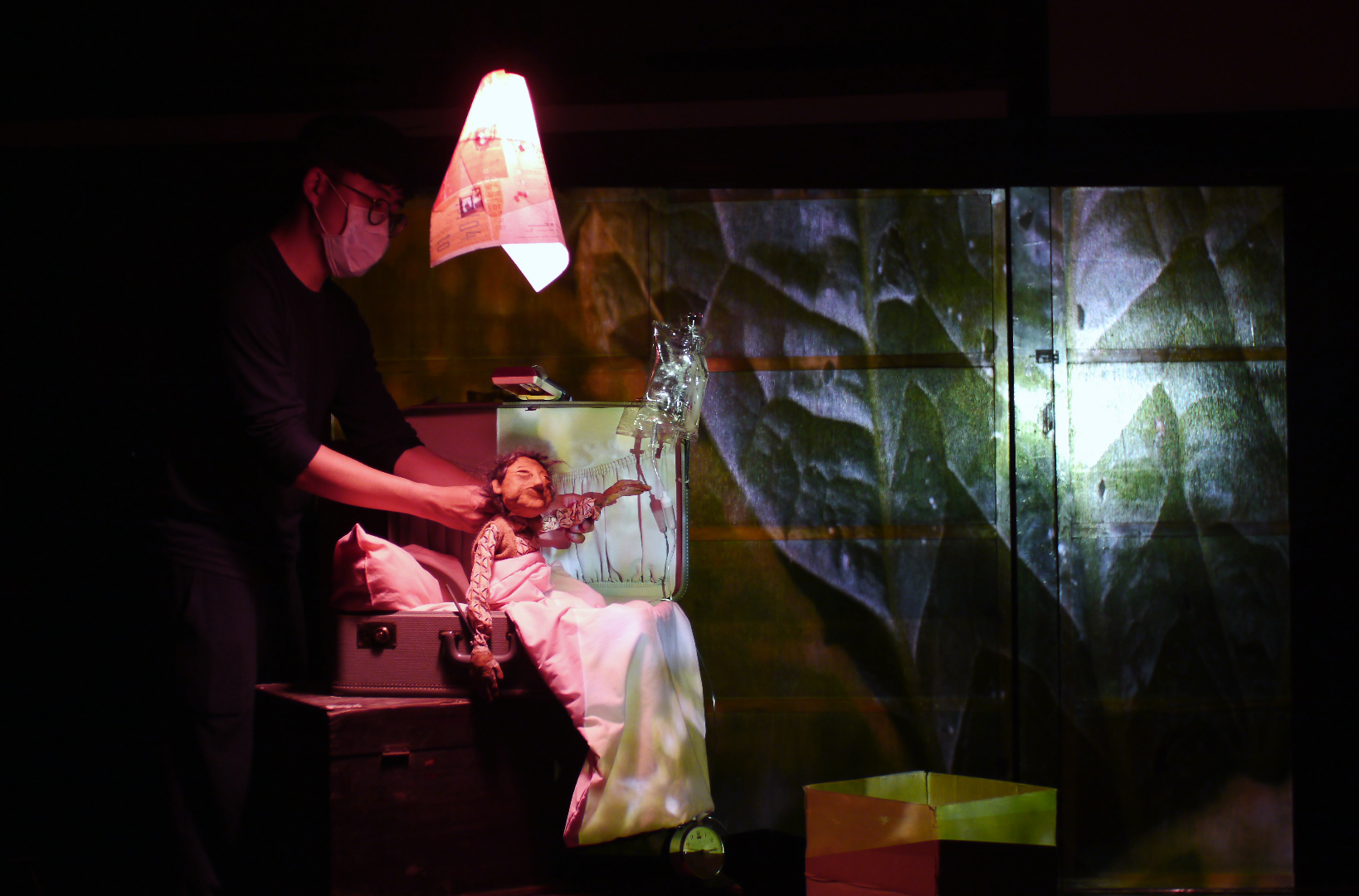
Hear the House, 2016 (courtesy of Flying Group Theatre)
In this way, Hear the House has continued to develop and become another important series of Flying Group Theatre. In 2019 and 2021, this project was again sponsored by NCAF. Apart from performances, she continues visiting local old buildings and organizing lectures and post-performance talks. Seeing both Close to You and Hear the House, it seems that Pei-Yu Shih has a predilection for "lectures on local literature and history". She explained, "Well…I would say that in our past old house projects, we just performed our work at a location. After interacting with that place, you eventually realize that it also has its own needs and expectations, that is, a hope that something other than the performance can happen. Sometimes we come across an old house and sometimes the foundation to which it belongs has some plans in progress, so we just go in and participate in its reinvigoration in a different approach." These words show Pei-Yu Shih's aspiration for a deeper bond with local communities, which is also found in the following quote from a 2021 news report: "…Pei-Yu Shih pointed out that they will not only perform but also stay in old buildings during their tour in Kinmen and Kaohsiung to become closer to the spaces."9 . In the proposal for Hear the House, the wording "deep cultivation" was also added to the title.
"What I mean by 'deep cultivation' is organizing something like a workshop." For the 2021 Hear the House project, Shih-Chi Wang and Yen-Ting Tseng, two artists who are also familiar with object theater, were invited to host the two-day workshops in Taipei, Kaohsiung, and Kinmen, one day each. "What we were doing was picking a topic and getting everyone (local people) involved to discover something together, to see if these things could give something (to the work) and be incorporated into Hear the House?" The workshops focused on "objects".
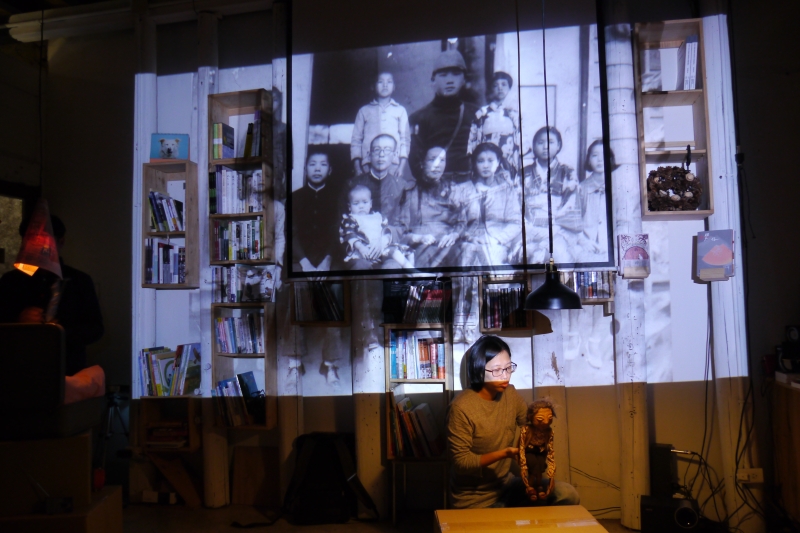
Hear the House, 2019 (courtesy of Flying Group Theatre)
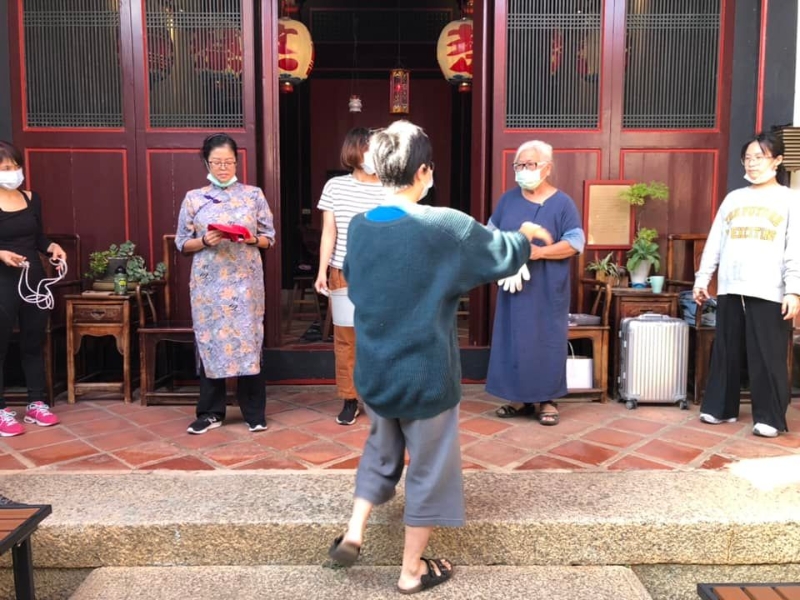
Hear the House: Local Objects Creative Workshop @ Kinmen, 2021 (courtesy of Flying Group Theatre)
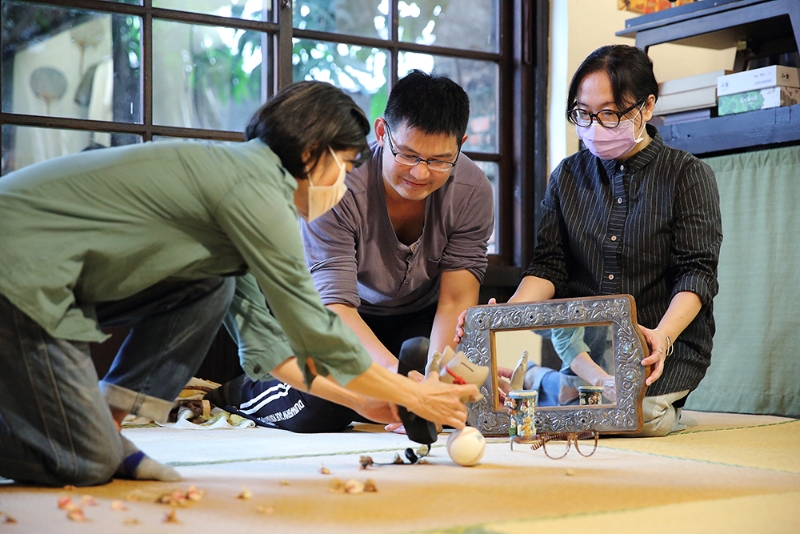
Hear the House: Local Objects Creative Workshop @ Kaohsiung, 2021 (courtesy of Flying Group Theatre)
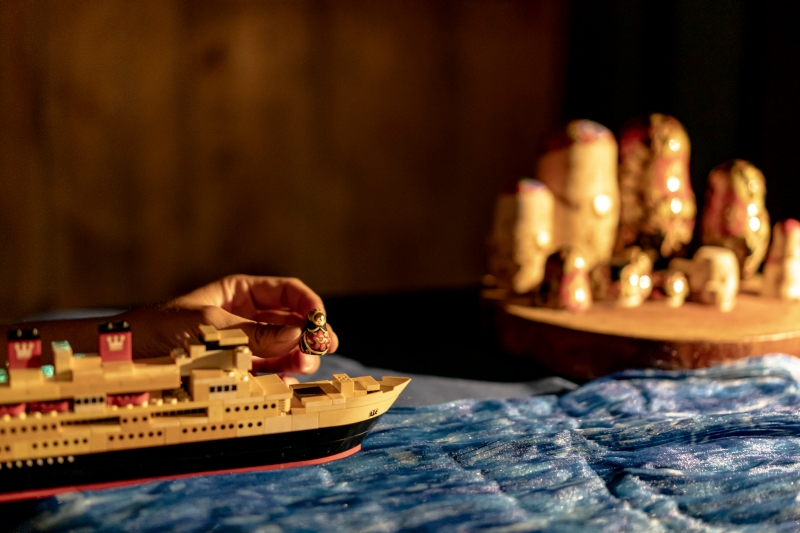
Hear the House: Treasured Fragment, Vol. 2: Home, 2021 (courtesy of Flying Group Theatre)
So, objects and puppets should be understood separately after all? "No, no", Pei-Yu Shih replied. Not separately. "I would maximize the scope of 'objects', which refers to all non-living things, so puppets are included." The modern puppet show, according to her, explores the relationship between humans and objects. "'Puppet' shows rely very much on puppet manipulation, but object theater does not place emphasis on 'manipulation'. On the contrary, it's anti-manipulation. It focuses on 'meaning'. For example, what is a mobile phone to us? A way of contact? A type of relationship in modern life? In object theater, when I present a mobile phone on stage, what can I evoke? We have long been looking for this kind of connection between humans and objects. Having said that, I have to admit that it is very abstract." The idea of deep cultivation via workshops is also derived from such approach and observations: As an artistic genre which does not work by "telling" in plain language, object theater is not very accessible to most people. Therefore, through actual practice, puppet show performers extract the feelings of an "object" from within themselves. In doing so, the meaning conveyed by a work of art is no longer unilaterally defined by the artist. In object theater, one might allow things to naturally form a "channel" to speak for themselves without verbal mediation, so that emotions and memories can flow reciprocally. "Everyone has a different sensibility. For example, what do you feel when you see a cup? Everyone has a different perception. What about a red cup and a white cup? A big one? A small one? Everyone has a different perception, which reflects the personal history and habits of each individual. When we were doing the workshop, it is as if we are introducing participants to a brand new thing…" It's like what a mentor does, showing their students something: "Hey, there is a grassland here. Ah, you have already made a path over there, but you see, this grass can still be divided in the middle like this and you can walk over from here. Or, if you want to walk over from another place, you don't need to remove all the grass. You can just remove the grass in the middle, and then we can try it out together and see where we can reach and what can see there."
Pei-Yu Shih is considering an even more profound next step: "I hope future workshops can be initiated even earlier to allow interactions for a longer time." Our target audience includes two segments. One is local residents and the other is young people with an idea of performing arts. In this way, more opportunities may be created to extend the influence of arts through deep communal connection.
Brick by brick and step by step, the troupe has progressively built each component of the "house", which can now accommodate more "guests"—which not only refers to new friends from various places mentioned above, but also includes Chien-Tsang Hong, their artist-in-residence since 2020. "Let me put it this way. Before 2020, the life of this troupe overlapped with mine. Or, rather, the status of my work and the direction of the troupe overlapped to some extent. Since Chien-Tsang joined us in 2020, the troupe has been developing into new things, in new directions." See the response to Chien-Tsang Hong's The Desperado of Longxing 46, completed in 2022. The future of Flying Group Theatre will be even more open-ended.
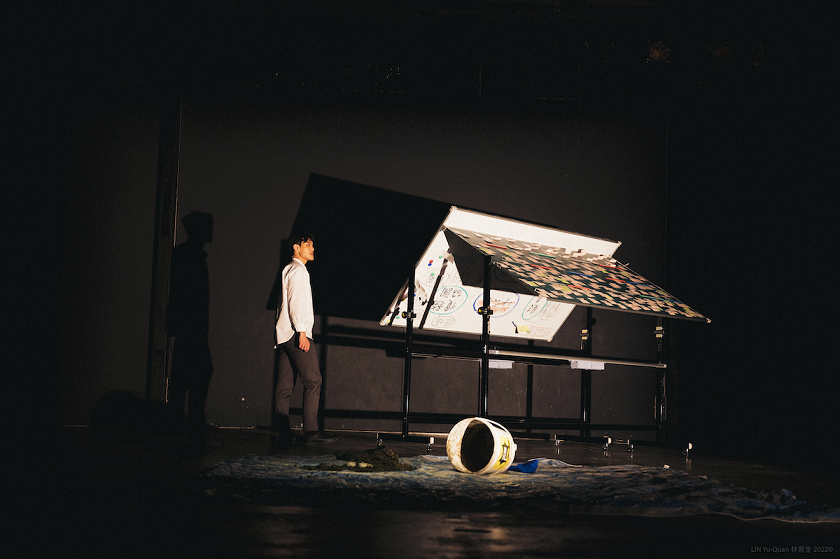
The Desperado of Longxing 46, 2022 (courtesy of Flying Group Theatre, play made and performed by Chien-Tsang Hong)
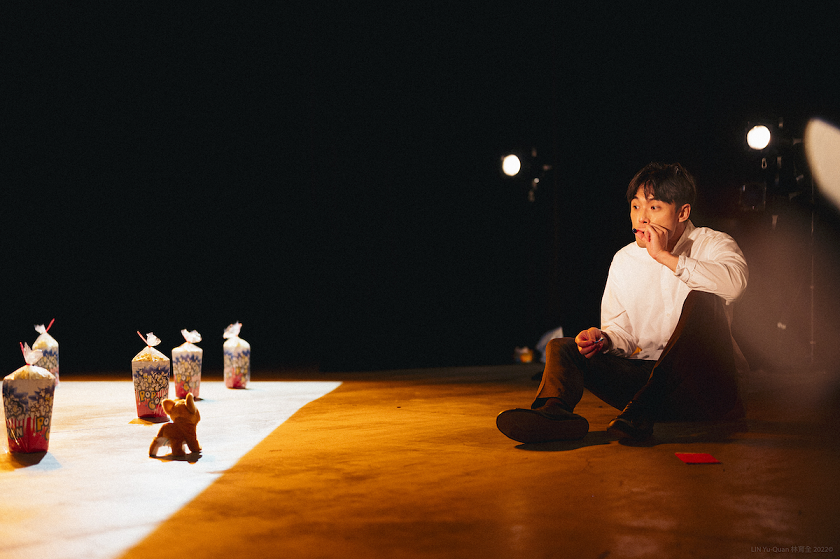
The Desperado of Longxing 46, 2022 (courtesy of Flying Group Theatre, play made and performed by Chien-Tsang Hong)
Tough Challenge in the Age of the Pandemic?
In many of the works of Flying Group Theatre, there is often a certain flavor and rhythm that is particularly "human", occasionally described as a "handmade touch" in some news articles. I asked Pei-Yu Shih, have the limitations brought by quarantines and the prevalence of going online due to the pandemic resulted in any obstacles to the persistence in delivering this handmade touch? She laughed and replied that she has never described the troupe's work as "handmade". In her view, the troupe has not particularly insisted on manual production when producing shows. She thinks that this rustic, handmade texture is a result of the overall aesthetic choice, which is not directly associated with the actual production method, handmade or otherwise. Therefore, going online is probably not a problem. However, "when I am in the audience, I don't like online stuff." Pei-Yu Shih confessed.
"Because no matter what incentives are offered to me, even gifts, I just don't like interacting with people via the computer screen. However, as an artist, I think maybe I need a shift in perspective. That is, don't regard the Internet as an alternative, but a radically different creative method. Maybe that can open new possibilities? It's just that this absolutely has something to do with 'equipment'. You have to get the equipment to be able to 'test' it and you won't know if it works unless you test it. But to get equipment, you must get funding first." However, funding does not mean one can buy and try the equipment, then throw it away and search for replacement simply because it is found to be unfit for the purpose. This is probably the more challenging aspect for the performing arts compared to other arts. The pandemic's impact was felt immediately. Even if artists' minds can theoretically adapt to such a rapid change, it is really difficult them to do anything substantially when it comes to physical equipment. No grants are provided to assist in buying equipment for going online. Even if we sought aid from our theater peers, most are in the same situation, unprepared to face such crisis.
"So you have to take a step back and think, fine, do I want to use this (online) medium? Is it fit suitable? Or, can it 'perpetuate' the current status of your work?" Perpetuate? "Yes. For example, if we still use objects as the key element, what possibilities can cameras bring to objects? What's the difference to the audience between sensing an object in person or through a camera? What kind of operability and performativity would that achieve?" If only low-level equipment is available, "how should we start? We have to try alternatives, like using only a mobile phone for the camera paired with very simple editing software, things like that." In doing so, she seems to be back to a certain starting point, from which she can explore the fundamentals of artistic creation and thus achieve a "handmade touch in a new era".
Although reality may force one to make some compromises, Pei-Yu Shih has always been sharp enough to see the most effective and promising alternative: "let's just focus on overcoming geographical isolation for a start." By the time of our interview, Flying Group Theatre has already been working on Close to You, its next project, which connects with works of foreign artists that Taiwanese audiences have never had the chance to see before. The repeated exchanges with puppetry and object artists from foreign countries painted a picture of creators around the world under the pandemic. "We're just moving forward, inviting people out there, and learning about their thoughts. She recalled: "An artist from Israel sent a proposal to us and expressed his wish to come to Taiwan. I said, why, but how can you come to Taiwan under these circumstances? I made a counter proposal to them. We have an online alternative, are you interested? He said in that case he would have to rehearse his play in a different approach." Pei-Yu Shih continued, after a pause: "Well, let's wait and see how he's going to do it." This remark might be Pei-Yu Shih's most candid response to the current circumstances—if we say that COVID-19 is a paintbrush that fell from heaven and drew a box to circumscribe everyone, then why don't we use the vision of the little prince on planet B612 in B612, to take a closer look inside the box and see what is in there?
References and Supplementary Materials
[1] Supplements: Information on funding received by Hear the House
Hear the House—2016 Old House Reinvigoration Tour Project: https://reurl.cc/vdKz9l
Hear the House—2019 Old House Reinvigoration Project: https://reurl.cc/YvkKlX
2021 Treasured Fragment 2.0—Old House Reinvigoration Project, Deep Cultivation: https://reurl.cc/VDmbX5
Hear the House—2016 Old House Reinvigoration Tour Project: https://reurl.cc/vdKz9l
Hear the House—2019 Old House Reinvigoration Project: https://reurl.cc/YvkKlX
2021 Treasured Fragment 2.0—Old House Reinvigoration Project, Deep Cultivation: https://reurl.cc/VDmbX5
[2] Excerpts of The Kitchen, 2004: https://www.youtube.com/watch?v=WoMcQRlordw .
[3] The full performance video is currently not available publicly on the Internet. The scenes described by the author are based on the full performance video provided by the troupe.
[4] For more details about the Taiwan Women Theatre Festival, see Wu, Yi-Jung. "Women's Voices, Sisters' Theater: A Preliminary Study of the Taiwan Women Theatre Festival", 2014. URL: https://reurl.cc/ane5DZ.
[5] Cheng, Tai-Chiung. "A Company Insisting on Travel in a Microscopic World". URL: https://reurl.cc/Wr8mye.
[6] B612 (2002) Full performance video: https://reurl.cc/d2QVog.
[7] Lu, Hong-Hui. "The Impact of Grants from the Ministry of Culture and NCAF on the Operations of Modern Theater Companies", 40 Years of Taiwan Contemporary Theater (1978-2018), p. 341.
[8] Information of Hear the House (2016) performances on the Flying Group Theatre website: https://www.flying-group.com.tw/portfolio/2016-hear-the-house/.
[9] The quote ". . . Pei-Yu Shih pointed out that they will not only perform but also stay in old buildings during their tour in Kinmen and Kaohsiung to become closer to the spaces." is from a report by Commercial Times in 2021: "Performing a Small Play in an Old House, Flying Group Theatre Tells a Home Story". URL: https://ctee.com.tw/livenews/ch/chinatimes/20211110005060-260405 .
[3] The full performance video is currently not available publicly on the Internet. The scenes described by the author are based on the full performance video provided by the troupe.
[4] For more details about the Taiwan Women Theatre Festival, see Wu, Yi-Jung. "Women's Voices, Sisters' Theater: A Preliminary Study of the Taiwan Women Theatre Festival", 2014. URL: https://reurl.cc/ane5DZ.
[5] Cheng, Tai-Chiung. "A Company Insisting on Travel in a Microscopic World". URL: https://reurl.cc/Wr8mye.
[6] B612 (2002) Full performance video: https://reurl.cc/d2QVog.
[7] Lu, Hong-Hui. "The Impact of Grants from the Ministry of Culture and NCAF on the Operations of Modern Theater Companies", 40 Years of Taiwan Contemporary Theater (1978-2018), p. 341.
[8] Information of Hear the House (2016) performances on the Flying Group Theatre website: https://www.flying-group.com.tw/portfolio/2016-hear-the-house/.
[9] The quote ". . . Pei-Yu Shih pointed out that they will not only perform but also stay in old buildings during their tour in Kinmen and Kaohsiung to become closer to the spaces." is from a report by Commercial Times in 2021: "Performing a Small Play in an Old House, Flying Group Theatre Tells a Home Story". URL: https://ctee.com.tw/livenews/ch/chinatimes/20211110005060-260405 .
*Translator: Linguitronics
More CASE STUDY
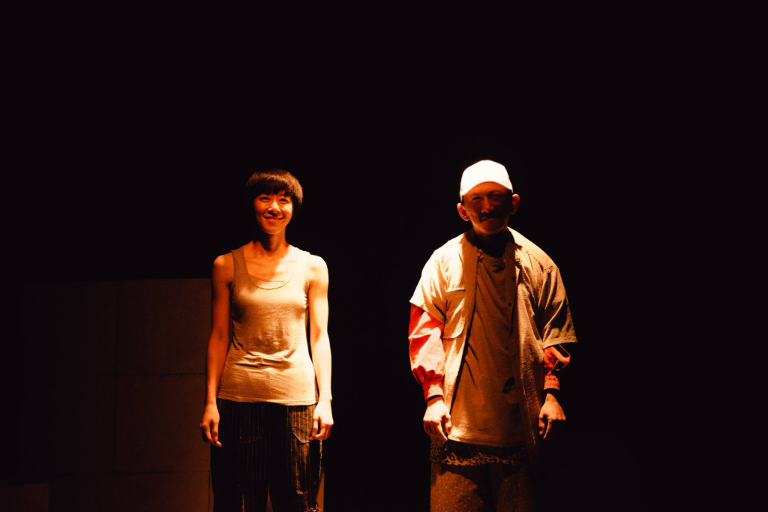
_1736490377300.jpg)
